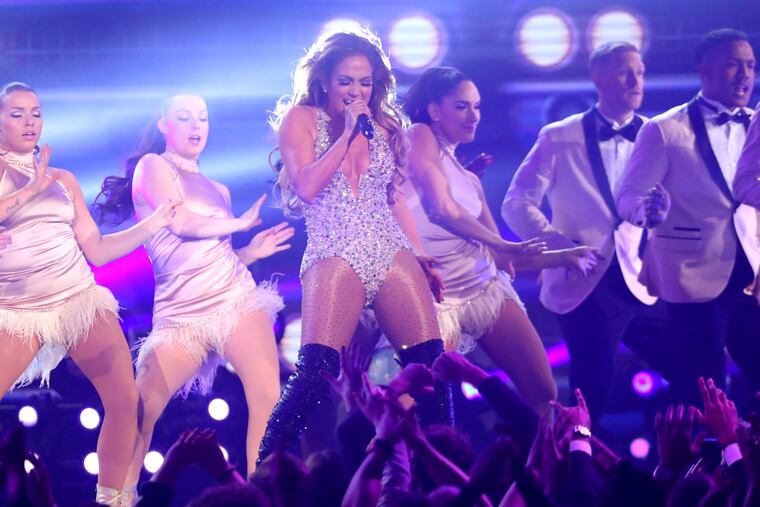Jennifer Lopez’s Motown tribute on the Grammys: What was that insulting foolishness? | Elizabeth Wellington
Sunday night’s performance was a slap in the face to history — in particular black women’s, who were the backbone of many of Motown’s greatest musical contributions.

This is hard for me to write because when it comes right down to it, I’m a fan of Jennifer Lopez going back to her days as an In Living Color fly girl.
In fact, when it was announced earlier this month that J. Lo was going to lead the Grammy tribute to Motown, I defended the choice. Lopez, I surmised, had every right to honor the legendary Detroit record label’s 60th anniversary. It was the soundtrack of her youth, just like it was mine.
But the rest of the world — including my mom who lived through Motown’s heyday — wasn’t having it.
Now, I see why.
Sunday night’s performance was a slap in the face to history — in particular black women’s, who were the backbone of many of Motown’s greatest musical contributions. And I know the Grammy’s know better because Miley Cyrus’ rendition of “Jolene” with her godmother Dolly Parton for Parton’s own tribute was just the perfect touch. In contrast, Lopez in all of her J. Lo glory gyrated in wanna be Beyoncé style in several places where we all know she shouldn’t have. Berry Gordy’s Motown was all about showcasing black people’s decorum during an era when it was believed they didn’t have any, so this whole hot mama business was a total mess.
But that performance reeking of poor taste was just the beginning: Lopez’s voice faltered terribly in her tired rendition of Martha and the Vandellas’ “Dancing in the Street” and The Marvelettes’ "Mr. Postman.” When she erroneously channeled “Proud Mary” Tina Turner for her rendition of Barrett Strong’s chart topper, “Money (That’s What I Want),” I cringed. (Even though Gordy wrote “Money,” Turner was never on Motown. In fact she recorded that song with her husband, Ike, on Liberty Records in 1971 in direct competition with Motown.)
Lopez’s followed that foolishness up with The Contours’ “Do You Love Me (Now That I Can Dance)” and a snippet of the Jackson Five’s beloved “ABC” in booty shaking tackiness that was more Vegas revue rather than classy Motown choreography. I so wish that she had left The Temptation’s “Papa was a Rolling Stone" all the way alone. And if it wasn’t for Neyo standing in for Stevie Wonder on “Another Star” I think I may have jumped through my television and kicked her off the stage myself.
To quote Russell from Fat Albert, the entire performance was the epitome of N.C. — No class.
I’m not saying that J. Lo shouldn’t have been a part of the celebration, there was no doubt she was inspired by the music. Like Smokey Robinson said in his defense of the performance, Motown music was made for everyone. But we shouldn’t ignore that the label was created back in 1959 because white-owned record labels were slow to let black people record their music. Motown turned black women, like Diana Ross, into stars. Black women were seen as more than mammy’s and cleaning ladies. We were glamorous and sexy and well-dressed without being Venus Hottentots.
To completely leave out black women in this tribute — especially with Janelle Monae and Ella Mai, the British singer who won a Grammy for best R & B song Sunday night for her 2018 summer hit “Boo’d Up” were in the audience and Mary J. Blige, Jennifer Hudson and Jill Scott presumably still breathing — the Grammys effectively erased black women from our own history. That was way beyond problematic. It was a stone cold mess.